MIT Lesson 29B Kanji: 第29B課の漢字
 Warning! There is Japanese text on this
page. If it looks like this: $BI4@i instead of this: "
Warning! There is Japanese text on this
page. If it looks like this: $BI4@i instead of this: " ", then read this.
", then read this.
 Athena users - for instructions on how to print this page,
read
this.
Athena users - for instructions on how to print this page,
read
this.
In the following definitions, on (Chinese-based) readings
are represented by katakana, and by capital romaji letters; kun
(native Japanese-based) readings are represented by hiragana, and by
lower-case romaji letters. This is a common dictionary convention, and
does not have any bearing on meaning.
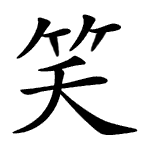
Printed form:
笑
Readings:
ショウ
わら(う)
Meaning:
to laugh
- Usage Examples:
- 笑ったり泣いたり
爆笑(ばくしょう)する
笑い声(わらいごえ) laughter
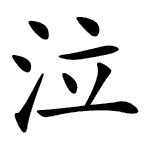
- Printed form:
- 泣
-
- Readings:
- キュウ
な(く)
- Meaning:
- to cry
-
- Usage Examples:
- 泣きたくない
泣き声
泣き顔
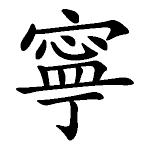
- Printed form:
- 寧
- Readings:
- ネイ
- Meaning:
- courteous
- Usage Examples:
- 丁寧(ていねい)
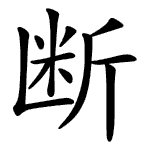
- Printed form:
- 断
- Readings:
- ダン
た(つ)
ことわ(る)or こと(わる)
- Meaning:
- to cut off, to sever
- Usage Examples:
- 義理があって断れない
横断(おうだん)する to cross, to go across
断念(だんねん)する to abandon, to give up
判断(はんだん)する to judge
たばこを断つことにした
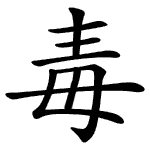
- Printed form:
- 毒
- Readings:
- ドク
- Meaning:
- poison
- Usage Examples:
- 毒ガス
毒がある
アルコール中毒 alchoholic
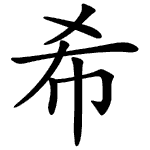
- Printed form:
- 希
- Readings:
- キ
まれ
- Meaning:
- rare, hope
- Usage Examples:
- 希望する職業
就職希望者
希少(きしょう)な薬 rare medicine
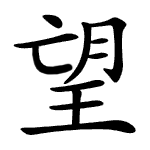
- Printed form:
- 望
- Readings:
- ボウ
のぞ(む)
- Meaning:
- to hope, to look after
- Usage Examples:
- 欲望(よくぼう) desire
絶望(ぜつぼう)する to despair
有望(ゆうぼう)な人 a promising person
平和を望む to wish for peace
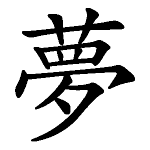
- Printed form:
- 夢
- Readings:
- ム
ゆめ
- Meaning:
- dream
- Usage Examples:
- 夢がない
夢を見た
悪夢(あくむ)
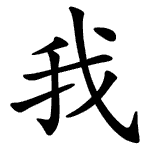
- Printed form:
- 我
- Readings:
- ガ
- われ
- Meaning:
- self
- Usage Examples:
- 我々
自我(じが)
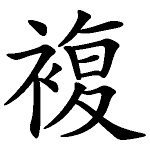
- Printed form:
- 複
- Readings:
- フク
- Meaning:
- double, compound, complex
- Usage Examples:
- 複雑な関係
複写(ふくしゃ) copy, duplication
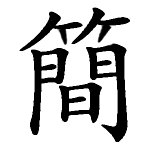
- Printed form:
- 簡
- Readings:
- カン
- Meaning:
- simple
- Usage Examples:
- 簡単には決められない
簡単な英語
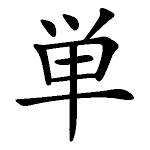
- Printed form:
- 単
- Readings:
- タン
- Meaning:
- single, one
- Usage Examples:
- 単純(たんじゅん)な性格 simplified, uncomplicated
単位(たんい) unit
単価(たんか) unit price
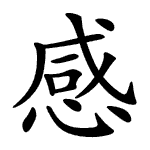
- Printed form:
- 感
- Readings:
- カン
- Meaning:
- sense, to feel
- Usage Examples:
- 感心(かんしん)する to be impressed
感動(かんどう)する to be touched
責任感(せきにんかん) sense of responsibility
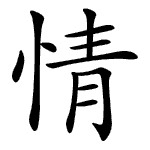
- Printed form:
- 情
- Readings:
- ジョウ
- Meaning:
- emotion, actual condition
- Usage Examples:
- 感情(かんじょう) emotion
愛情(あいじょう) affection
友情(ゆうじょう) friendship
情報(じょうほう) information
事情(じじょう) situation
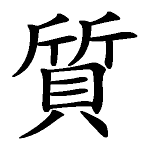
- Printed form:
- 質
- Readings:
- シツ
- シチ
- Meaning:
- quality
- Usage Examples:
- 質問に答える
性質(せいしつ) nature, quality, temperament
物質(ぶっしつ) substance
質(しつ)がいい good quality
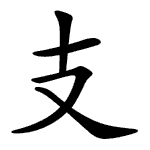
- Printed form:
- 支
- Readings:
- シ
ささ(える)
- Meaning:
- support, branch
- Usage Examples:
- 銀行の名古屋支店
支社(ししゃ) branch office
私を支えてくれた人達
支配(しはい)する to control, to govern
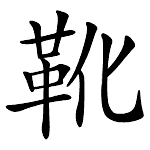
- Printed form:
- 靴
- Readings:
- カ
- くつ
- Meaning:
- shoes
- Usage Examples:
- イタリア製の靴
- 靴を磨く(みがく) to polish
shoes
- 靴下
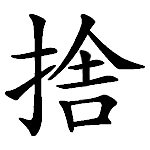
- Printed form:
- 捨
- Readings:
- シャ
す(てる)
- Meaning:
- to discard
- Usage Examples:
- ゴミを捨てる
四捨五入(ししゃごにゅう) round off (to the nearest whole number)
[Japanese
6 Kanji] [Japanese
6]
![]() Warning! There is Japanese text on this
page. If it looks like this: $BI4@i instead of this: "
Warning! There is Japanese text on this
page. If it looks like this: $BI4@i instead of this: "![]() ", then read this.
", then read this.![]() Athena users - for instructions on how to print this page,
read
this.
Athena users - for instructions on how to print this page,
read
this.
















